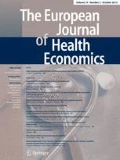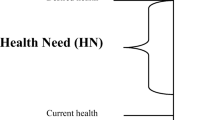Abstract
The criterion of medical need figures prominently in the Dutch model for reimbursement decisions as well as in many international models for health care priority setting. Nevertheless the conception of need remains too vague and general to be applied successfully in priority decisions. This contribution explores what is wrong with the proposed definitions of medical need and identifies features in the decision-making process that inhibit implementation and usefulness of this criterion. In contrast to what is commonly assumed, the problem is not so much a failure to understand the nature of the medical need criterion and the value judgments involved. Instead the problem seems to be a mismatch between the information regarding medical need and the way in which these concerns are incorporated into policy models. Criteria—medical need, as well as other criteria such as effectiveness and cost-effectiveness—are usually perceived as “hurdles,” and each intervention can pass or fail assessment on the basis of each criterion and therefore be included or excluded from public funding. These models fail to understand that choices are not so much between effective and ineffective treatments, or necessary and unnecessary ones. Rather, choices are often between interventions that are somewhat effective and/or needed. Evaluation of such services requires a holistic approach and not a sequence of fail or pass judgments. To improve applicability of criteria that pertain to medical need we therefore suggest further development of these criteria beyond their original binary meaning and propose meaningful ways in which these criteria can be integrated into policy decisions.

Similar content being viewed by others
References
Ministry of Health Welfare and Sports (2004) Health insurance in The Netherlands. Status as of 1 January 2004. In: International Publication Series Health, Welfare and Sports: The Hague
Andersen R et al. (2001) Cost containment, solidarity and cautious experimentation: Swedish dilemmas. Soc Sci Med 52:1195–1204
Government Committee on Choices in Health Care (1992) Choices in health care. Ministry of Welfare, Health and Cultural Affairs: Rijswijk
Van de Vathorst S (2001) Justice, solidarity & responsibility in Dutch health care. Your money or my life. Thesis, Vrije Universiteit, Amsterdam
Ham C, Robert G, Ham C, Robert G (2003) Reasonable rationing. International experience of priority setting in health care. Open University Press: Maidenhead
Norheim OF (1999) Healthcare rationing—are additional criteria needed for assessing evidence based clinical practice guidelines? BMJ 319:1426–1429
Robinson R (1999) Limits to rationality: economics, economists and priority setting. Health Policy 49:13–26
Devlin N, Parkin D (2004) Does NICE have a cost-effectiveness threshold and what other factors influence its decisions? A binary choice analysis. Health Econ 13:437–452
Al MJ, Feenstra T, Brouwer WBF (2004) Decision makers’ views on health care objectives and budget constraints: results from a pilot study. Health Policy 70:33–48
Commission on the Future of Health Care in Canada (2002) Medically necessary: what is it, and who decides? Health Care Commission: Ottowa
Toenders WGM (2001) Breedte geneesmiddelenpakket. Report no 01-54. College voor Zorgverzekeringen: Amstelveen
Ministry of Health Welfare and Sports (2002) Medicines policy in The Netherlands. Status as of 1 January 2002. In: International Publication Series Health, Welfare and Sports: The Hague
Annemans L et al. (1997) Pricing and reimbursement of pharmaceuticals in Belgium. Pharmacoeconomics 11:203–209
Bleichrodt H, Doctor J, Stolk EA (2005) A nonparametric elicitation of the equity-efficiency tradeoff in cost-utility analysis. J Health Econ (in press)
Pronk MH, Bonsel GJ (2004) Out-patient drug policy by clinical assessment rather than financial constraints? Eur J Health Econ 5:274–277
Pelen F (2000) Reimbursement and pricing of drugs in France. Health Econ Prevent Care 1:20–23
Bonsel GJ, Jansen MF, Birnie E (2003) Mild diseases & ailments study. Ziektelast bepaling van 27 vermoedelijk ‘lichte’ ziekten ten behoeve van rationele beperking van het geneesmiddelenpakket: samenvatting [in Dutch]. Afdeling Sociale Geneeskunde, AMC: Amsterdam
Wieringa NF, Van Dieten HEM, Eijgelshoven MHJ (2003) Ziektelast toegepast op het geneesmiddelenpakket [in Dutch]. Report no 176. College voor Zorgverzekeringen: Diemen
Kooijman H (2004) Zorg verzekerd [in Dutch]. Med Contact 59:63
Mechanic D (1997) Muddling through elegantly: finding the proper balance in rationing. Health Affairs 16:83–92
Acknowledgements
In preparing this paper we were helped by Frans Rutten, Jan van Busschbach, and Werner Brouwer, who kindly made useful comments on earlier drafts. Although the ideas presented in this paper do not necessarily represent their points of view, we owe them for the way their arguments helped us to focus more sharply on the political and theoretical issues involved.
Conflict of interest:
No information supplied
Author information
Authors and Affiliations
Corresponding author
Rights and permissions
About this article
Cite this article
Stolk, E.A., Poley, M.J. Criteria for determining a basic health services package. Eur J Health Econ 6, 2–7 (2005). https://doi.org/10.1007/s10198-004-0271-0
Issue Date:
DOI: https://doi.org/10.1007/s10198-004-0271-0




